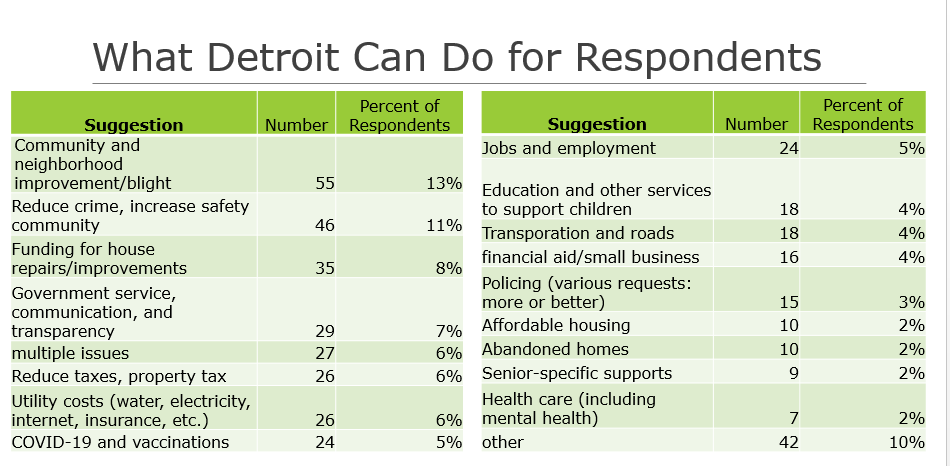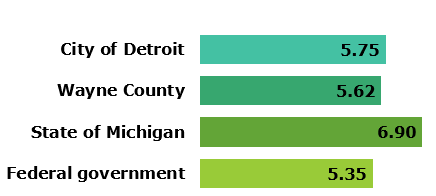The Wayne State University Center for Urban Studies worked with MDP Black Caucus to develop the 2021 Detroit Resident Survey. This survey, based upon a random sample of Detroit residents found that the top area of improvement citizens want is community and neighborhood improvement/blight reduction. The second most frequently sought improvement was a reduction in crime together with an increase in community safety. Overall, there were 18 general areas that survey respondents said the City of Detroit can do to help them and their household. The 621 respondents to the survey made 437 suggestions on how the City can be improved.
As noted, the most common suggestion on what Detroit can do for citizens is to improve its community and neighborhoods and remove blight. Thirteen percent of respondents, or 55 citizens, made this suggestion. Eleven percent of respondents, or 46 citizens, suggested reducing crime and increasing community safety.

Blight and neighborhood improvements have long been a concern in the City of Detroit and while work has been done over the last several years, clearly residents still have concerns–as do community leaders. Between 2014 and 2020 more than 15,000 homes in the City of Detroit were knocked down with $265 million in federal funding. There are about 22,000 vacant properties left in the City that need to be addressed; the recent passage of Detroit’s Proposal N states the $250 million bond will allow an additional 8,000 to be razed and 6,000 to be secured.
On behalf of the Gilbert Family Foundation and Rocket Community Foundation, Dan and Jennifer Gilbert pledged $500 million over the next 10 years toward improving the Detroit community. The first $15 million will go toward paying the property taxes of 20,000 low income homeowners in the City. How the remainder of the donation will be spent has yet to be determined, but it could go toward things like digital equity, home repairs, housing access and employment. It is agreed upon though that with the funding must come a long-term strategy.
A reduction in blight can also improve community safety, according to a study by Wayne State University criminologists Matthew Larson and Charles Klahm IV. Larson and Klahm looked at Detroit crime data in areas where nearly 9,400 blighted homes were demolished between 2010 to 2014. According to their study they found that such blight demolitions reduced violent and property crimes. The study found that for about every three demolitions block-groups experienced about a 1 percent reduction in crime.
With a host of suggestions on how the City of Detroit can improve life for its residents it should not be a surprise than on a scale of 1-10 2021 Detroit Resident Survey respondents ranked their satisfaction with City leadership at a 5.75. Respondents rated their satisfaction with Wayne County leadership at a 5.62, at 6.9 with the State of Michigan’s leadership and 5.35 with the leadership at the federal level.

Tomorrow, we will further dig into the concerns of Detroit citizens, highlighting specific household and community concerns.